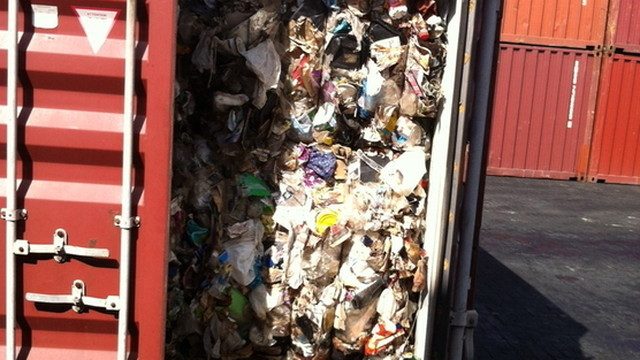SUMMARY
This is AI generated summarization, which may have errors. For context, always refer to the full article.

MANILA, Philippines – Waste juice has begun forming in the 50 container vans of garbage from Canada, posing health and environmental risks to people.
The container vans, each 40 feet long, are now in the bay area of the Manila International Container Terminal, where they remain unclaimed since the first vans arrived at the port in June 2013.
“They’ve been here for 9 months. Fluid has already been accumulating inside since garbage naturally creates leachate. The garbage juice is now leaking,” said Anna Kapunan of health advocacy group Ang Nars.
The 18 vans opened by the Bureau of Customs (BOC) contain plastic bottles, plastic bags, newspapers, household garbage, and used adult diapers – waste which are classified as hazardous under the Toxic Substances and Hazardous and Nuclear Waste and Control Act of 1990 (Republic Act 6969).
“The diapers contain harmful secretions – urine, maybe even feces. These contain bacteria that can contaminate the environment and cause viral, bacterial, and parasitic infections,” Kapunan told Rappler.
Bureau of Customs staff and depressed communities around the port are at high risk of infection if the waste juice leaks out of the vans.
Contamination risk can rise once the approaching rainy season arrives, said a worried Kapunan. Harmful substances leaking out of the container vans can spread faster when carried by water.
The Department of Health (DOH) Bureau of Quarantine is now getting clearance to disinfect the 18 opened vans using an organic method of disinfection, which will cost the government P20,000.
That’s on top of the rent the government pays every day so the vans can stay in that area of the port reserved for unclaimed and dirty shipments.
Contamination threat
The 50 container vans arrived in 6 batches from June to August, shipped by Chronic Incorporated, an export company based in Ontario, Canada.
They had been steadily accumulating in the port, unclaimed by the consignee of the shipment – Chronic Plastics, a company based in Valenzuela City.
In January, the BOC decided to open the vans since shipments not claimed for a long period of time are red flags for potentially dangerous imports. The 18 container vans they opened contained the mixed garbage.
The BOC decided to stop opening the rest of the vans to prevent further contamination in case they too contain hazardous waste.
The agency has filed charges against Chronic Plastics owner Adelfa Eduardo and the company’s two licensed customs brokers.
Aside from violating Republic Act 6969, they are also accused of violating the Tariff and Customs Code of the Philippines since the vans were declared as containing “homogenous” plastic scraps for recycling.
Eduardo had been replying to Kapunan and the BOC through her lawyer until mid-March but since the issue began appearing in the media, she cannot be reached.
Not a dumping ground
Environment and health groups like Ang Nars, Ban Toxics, and Greenpeace are demanding for the immediate re-export of the container vans back to Canada.
“The Philippines is not a dumping soil for Canadian garbage. Imagine someone else dumping 50 bags of garbage in your garden and expecting you to handle it,” decried Kapunan.
A petition for the re-export of the container vans now has more than 6,600 signatures. The group has also written to Canada ambassador to the Philippines Neil Reeder.
Reeder told media on March 26 that the Embassy of Canada “has given assurances of its full cooperation with Philippine authorities in resolving this matter.”
The Department of Environment and Natural Resources has sent a letter to its counterpart in Canada, Environment Canada, on the repatriation of the smuggled waste. The agency has yet to respond to the letter.
But the long-term goal of petitioners is for the implementation of international laws that stop hazardous waste from reaching developing countries like the Philippines.
Groups want the government to ratify the Basel Ban Amendment, a provision in the Basel Convention that prohibits all export of waste from developed countries to developing countries regardless of whether or not they are intended for recycling.
The amendment needs the ratification of 17 more countries before it can enter the force of law. – Rappler.com
Add a comment
How does this make you feel?
There are no comments yet. Add your comment to start the conversation.